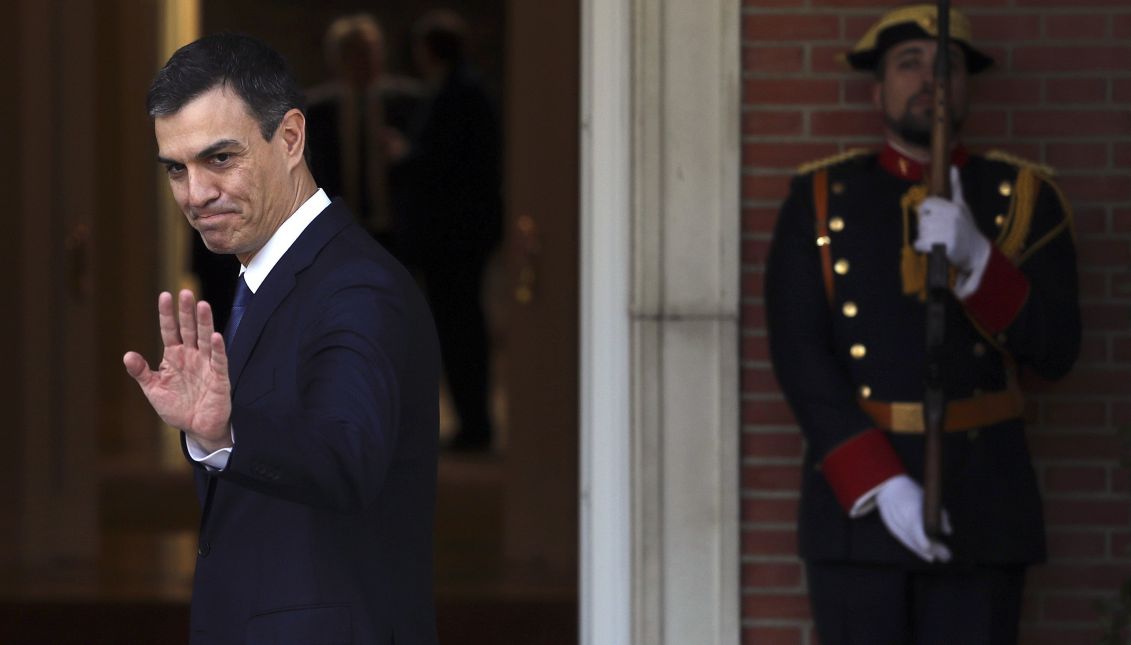
Spain: New president, new challenges
Spain’s new prime minister, Pedro Sánchez, took office on Saturday and is now forced to confront the Catalonia crisis.
Southern Europe began this week facing old and new challenges.
In the Mediterranean Sea, dozens of immigrants drowned over the weekend as they tried to make the leap from Africa to the European continent in precarious boats. In Italy, a new coalition government comprised of the populist Five Star Movement and the League, an anti-immigration party, was formed. And in Spain, Pedro Sánchez started his mandate as new prime minister after his predecessor Mariano Rajoy was ousted over a long-running corruption scandal that tainted his conservative party, Partido Popular (PP).
Rajoy was ousted as Spain’s prime minister on Friday after a vote of no confidence in Parliament, and the inheritance he leaves in the hands of Mr. Sánchez is a thorny one.
First, Sánchez will have to deal with the Catalan conflict.
In achieving victory in the non-confidence vote in Congress last week, Sánchez had the support of Catalan nationalist parties, which are now asking him to open the dialogue that Rajoy always opposed.
The Catalan separatist conflict began to seriously worsen in September 2016 after the parliament of Catalonia, controlled by a majority of independentist parties, approved two laws that, according to the Spanish Justice, were unconstitutional: a law to call a referendum on independence on October 1, and another law to prepare for the departure of Spain in case the "yes" won.
Despite being "unconstitutional," the Catalan government called the referendum, which could not be conducted under appropriate conditions because of Rajoy's government's measures to prevent it, including sending anti-riot police patrols to evict polling stations, creating controversial scenes of police brutality against defenseless voters armed only with paper ballots.
RELATED CONTENT
Since the 1-0 referendum, the Catalonia-Madrid conflict has escalated. With the backing of thousands of protesters on the street every day, then Catalan President Carles Puigdemont, in view of Madrid's lack of will for dialogue, decided to carry out a unilateral declaration of independence (based on the dubious results of the referendum). A few days later, the government of Rajoy, with the support of the socialist party of Sánchez and Ciudadanos, a young neoliberal party and PP's ally in Congress approved in the Senate the application of Article 155 of the Constitution, which allows for the cancellation of all the autonomic powers of any Spanish region if its regional government does not respect the Constitution.
In addition, the members of the Catalan government at that time were accused by the Office of the Prosecutor of rebellion, a crime that can lead to more than 30 years in prison. To avoid being arrested, various members of the Catalan government, including then-President Puigdemont, fled to Brussels and today continue to be "exiled" in Europe. The rest are in jail, awaiting trial. The leaders of two separatist grassroots organizations—Jordi Sánchez and Jordi Cuixart, known as "the Jordis"—have also been imprisoned. They are both accused of sedition.
After the application of Article 155, early elections were called in Catalonia in which the independentists won again by a simple majority. The new Catalan president, Quim Torra, who took office just a few weeks ago, has urged President Sánchez to reopen the door of dialogue with Catalonia.
"Destiny wanted the fall of Rajoy and the constitution of a new Catalan government to coincide in time. And two politicians who did not count at all today have an opportunity to make history if they are skilled and know how to do just what their predecessors did not know," wrote analyst Jordi Juan in the Barcelona newspaper La Vanguardia.
It will not be easy for Sánchez to open dialogue with Catalonia, given that he does not have the support of all of his party members to do it. And much less from the PP and Ciudadanos, which are both led by Spanish nationalists. "Any agreement in Catalonia will be sold as high treason to the Spanish nation," warns the analyst of La Vanguardia.
But there is light at the end of the tunnel, no matter how small.











LEAVE A COMMENT: